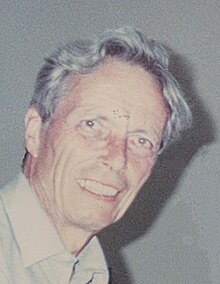Loading AI tools
From Wikipedia, the free encyclopedia
Otto Detlev Creutzfeldt (1 April 1927 – 23 January 1992) was a German physiologist and neurologist. He was the son of Hans Gerhard Creutzfeldt and the younger brother of Werner Creutzfeldt, a professor of internal medicine.
Otto Detlev Creutzfeldt | |
|---|---|
 Otto Detlev Creutzfeldt | |
| Born | 1 April 1927 |
| Died | 23 January 1992 (aged 64) |
| Nationality | German |
| Known for | Cortex physiology |
| Scientific career | |
| Fields | Neurologist |
| Institutions | Max Planck Institute for Biophysical Chemistry |
A remarkable career made Creutzfeldt a renowned researcher.[1][2] Creutzfeldt attended the gymnasium (high school) in Kiel. At university he first studied the humanities, but soon switched to medicine, and obtained his M.D. at Freiburg University in Germany in 1953. From 1953 and 1959 he was an assistant and trainee in physiology with Prof. Hoffmann (Freiburg), in psychiatry with Prof. Miiller (Bern), and in neurophysiology and neurology with Prof. Jung (Freiburg). He continued to work for two years as a research anatomist at UCLA Medical School before moving to the Max Planck Institute for Psychiatry in Munich, where he stayed from 1962 to 1971. Creutzfeldt obtained there his degree in clinical neurophysiology (University of Munich). In 1971 he became one of the nine directors of the Max Planck Institute for Biophysical Chemistry, as head of the Department of Neurobiology.
1992 The K-J. Zülch Prize of the Gertrud Reemtsma Foundation awarded posthumously for "Neurophysiology of neuronal correlates of higher behavioral performance, particularly of sight and speech.[3]
Creutzfeldt had a profound impact on neuroscience, in particular in Germany, for he had an unusually large number of pupils who held chairs in German universities, Max Planck Institutes and, Leibniz Institutes. From 1992 a lecture is given yearly, and from 1999 biennial, by distinguished scientists to his honour at the University of Göttingen during the Meeting of the German Neuroscience Society ("The Otto-Creutzfeldt-Lecture").[4]
Creutzfeldt O.D. (1983) Cortex cerebri. Springer, Berlin Heidelberg New York
Seamless Wikipedia browsing. On steroids.
Every time you click a link to Wikipedia, Wiktionary or Wikiquote in your browser's search results, it will show the modern Wikiwand interface.
Wikiwand extension is a five stars, simple, with minimum permission required to keep your browsing private, safe and transparent.